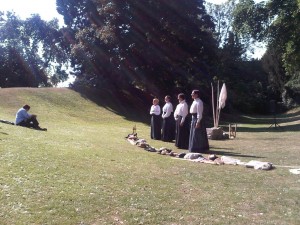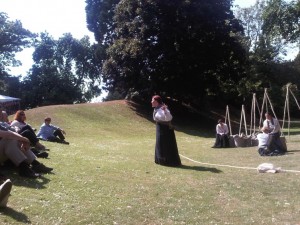 A week ago today, just as the sun started shining on Devon I went to see Oxygen at the Rougemont Gardens in Exeter. Not only was the weather perfect, but the location couldn't have been more historically ideal; the Rougemont Gardens were originally part of Exeter Castle's moat, and it was within the castle walls that the four ‘Devon witches’ were tried in the 1680s, before becoming the last women in England to be executed for witchcraft. As a final bonus, it was also Independence Day which, while predominantly an American day of remembrance, it struck me as being pretty appropriate, as what else were these women marching for, 100 years ago, if not independence?
A week ago today, just as the sun started shining on Devon I went to see Oxygen at the Rougemont Gardens in Exeter. Not only was the weather perfect, but the location couldn't have been more historically ideal; the Rougemont Gardens were originally part of Exeter Castle's moat, and it was within the castle walls that the four ‘Devon witches’ were tried in the 1680s, before becoming the last women in England to be executed for witchcraft. As a final bonus, it was also Independence Day which, while predominantly an American day of remembrance, it struck me as being pretty appropriate, as what else were these women marching for, 100 years ago, if not independence?
I did not know of the historical facts surrounding the location of the play until after I had watched Oxygen, while speaking to playwright Natalie McGrath, but it definitely made me think even more about the play’s message, and the suffering of women before and, arguably, after the suffragists made their biggest and most public stand, at the Great Pilgrimage of 1913.
I will not go through the plot here, as I’m sure whatever I say could never to justice to Natalie’s brilliant vision, plus I don’t want to spoil it for those of you who are yet to see it – you must! What I will say though, is the amazing sense of unity I got from Oxygen; from the obvious chemistry between the small, yet in no way lacking, cast of just five women, to the relationships between the characters.
 I had already seen the cast: Rebecca Hulbert, Michelle Ridings, Rachel Rose Reid, Stevie Thompson and Carolyn Tomkinson in action, during a visit to their rehearsals at the Phoenix Centre in Exeter and, although this was only the first week of rehearsals, I could see as early as then the close bond between these ladies. This definitely helped to increase the realism of the connections between the characters on stage, and made me think of my own close female friendships.
I had already seen the cast: Rebecca Hulbert, Michelle Ridings, Rachel Rose Reid, Stevie Thompson and Carolyn Tomkinson in action, during a visit to their rehearsals at the Phoenix Centre in Exeter and, although this was only the first week of rehearsals, I could see as early as then the close bond between these ladies. This definitely helped to increase the realism of the connections between the characters on stage, and made me think of my own close female friendships.
At first glance, or upon first hearing about Oxygen, you may assume that it will only be telling the tale of the physical journey these women undertook 100 years ago but, on the contrary, Oxygen demonstrates the emotional journey too; I would argue that it focuses on this more. I had not really thought about it before, but of course these women left behind family, friends, lovers, in order to take up a cause, and make a stand, for the rest of us women. Moreover, the suffragettes and suffragists would most likely not have known many, if any, other women on the pilgrimage; rather being united in their common desire for equality, and would thus have had to make new friendships and loyalties along way. Oxygen depicts this sense of leaving loved ones behind; most poignantly in one scene where a character played by Carolyn Tomkinson tries to convince her female lover to go on the pilgrimage with her, and leave her abusive husband behind, so that they might one day be free to be together again, no longer suffering the prejudiced views of society. At the same time, Oxygen portrays the loyalties, and incredible friendships that are established between these women, and how much they mean to one another. Moreover, the play tells of the unity of those who call themselves suffragettes and suffragists, and the love and respect these women are hard for each other, even when they had not met. This is demonstrated most clearly, and movingly, in a scene where the cast take a minute's silence for Emily Wilding Davison, who died on June the 8th, 1913, whilst trying to pin her suffragette ribbon onto the King's horse, so the colours could be carried over the finishing line for the world to see1.
 This sense of solidarity was further emphasised by the staging, where the cast would stand shoulder-to-shoulder at the front of the stage2, or as one unit centre-stage3, with their banners held proudly above them.
This sense of solidarity was further emphasised by the staging, where the cast would stand shoulder-to-shoulder at the front of the stage2, or as one unit centre-stage3, with their banners held proudly above them.
The audience was made to feel part of the action and, subsequently, part of the cause too as, not only were we at the front incredibly close to the actors, physically, they would often step 'offstage' to address us; deliberately acknowledging our presence, and calling for our support.
This gave Oxygen an even greater sense of authenticity, whilst making us as the audience aware of our reactions to being questioned and challenged by the characters, as well as forcing us to think about what we would have done had this been 100 years ago.
 All in all, I would say that Oxygen was a brilliant and hugely uplifting experience, and one that, I hope, will never be outdone by any other production in the near future. It is a play that really encourages the spectator to participate, and to think about the plight of women decades before they were even born, the challenges and sacrifices the suffragettes and suffragists made, and of their own views and, perhaps, prejudices. Oxygen has people talking, and I am sure this will continue throughout its tour and, undoubtedly, for a long time afterwards. I know that my friends and I were singing the songs of Oxygen all the way home, so perhaps by the end of the tour in mid-July, the whole south of the country will be singing of the suffragettes and suffragists, and passing their message on.
All in all, I would say that Oxygen was a brilliant and hugely uplifting experience, and one that, I hope, will never be outdone by any other production in the near future. It is a play that really encourages the spectator to participate, and to think about the plight of women decades before they were even born, the challenges and sacrifices the suffragettes and suffragists made, and of their own views and, perhaps, prejudices. Oxygen has people talking, and I am sure this will continue throughout its tour and, undoubtedly, for a long time afterwards. I know that my friends and I were singing the songs of Oxygen all the way home, so perhaps by the end of the tour in mid-July, the whole south of the country will be singing of the suffragettes and suffragists, and passing their message on.
